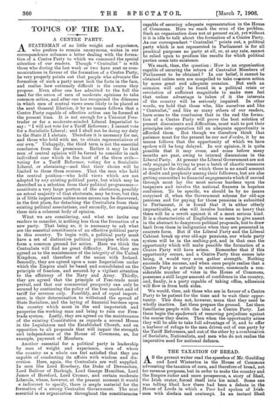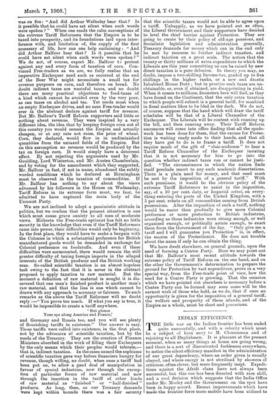THE TAXATION OF BREAD.
AS the present writer read the speeches of Mr. Goulding and Lord Winterton in the House of Commons advocating the taxation of corn, and therefore of bread, not for revenue purposes, but in order to make the country and the Empire richer and more prosperous, a story of Shell, the Irish orator, forced itself into his mind. Some one was telling Shell how there had been a debate in the House of Lords in which a Peer had spoken of Irish- men with disdain and contempt. In an instant Shell was on fire: "And did Arthur Wellesley bear that ? Is it possible that he could have sat silent when such words were spoken ? " When one reads the calm assumptions of the extreme Tariff Reformers that the Empire is to be taxed into prosperity, and its foundations laid upon inter- ference with, and limitation of, the supply of the first necessary of life, how can one help exclaiming : " And did . Arthur Balfour hear that ? Is it possible that he could have sat silent when such words were spoken ? " We do not, of course, expect Mr. Balfour t, protest against any and every form of taxation of corn. Con- vinced Free-traders as we are, we fully realise that an imperative Exchequer need such as occurred at the end of the Boer War might necessitate a small tax for revenue purposes on corn, and therefore on bread. No doubt indirect taxes are wasteful taxes, and no doubt there are many practical objections to food-taxes of a kind which cannot be avoided even by the very poor, as can taxes on alcohol and tea. Yet needs must when an empty Exchequer drives, and no sane Free-trader would ever in the abstract declare against tariff for revenue. But Mr. Balfour's Tariff Reform supporters said little or nothing about revenue. They were inspired by a very different idea, the idea that by keeping foreign corn out of this country you would cement the Empire and actually cheapen, or at any rate not raise, the price of wheat. Corn, they declared, would flow in in undiminished quantities from the untaxed fields of the Empire. But on this assumption no revenue would be produced by the tax on foreign corn. It would simply have a deterrent effect. By not rejecting the arguments used by Mr. Goulding, Lord Winterton, and Mr. Austen Chamberlain, and by voting for the amendment which they supported, Mr. Balfour in fact, if not in name, abandoned the subtly worded conditions which he declared at Birmingham must be observed in the taxation of commodities. If Mr.. Balfour has nothing to say about the views advanced by his followers in the House on Wednesday, Tariff Reform in its extreme form must, we fear, be admitted to have captured the main body of the Unionist Party.
We are not inclined to adopt a pessimistic attitude in politics, but we confess that the present situation is one which must cause grave anxiety to all men of moderate views. Hitherto the Free-trade optimist has felt no little security in the knowledge that even if the Tariff Reformers came into power, their difficulties would only be beginning. In the first place, they would have to make a bargain with the Colonies in which a substantial preference for British manufactured goods would be demanded in exchange for Colonial preference on foodstuffs. And even if these difficulties were surmounted, there would remain the still greater difficulty of taxing foreign imports in the alleged interests of the British producer and the British working man. So-called scientific taxation is an almost hopeless task owing to the fact that it is never in the abstract proposed to apply taxation to raw material. But the moment a definition of raw material is sought it is dis- covered that one man's finished product is another man's raw material, and that the line is one which cannot be drawn with any approach to accuracy or fairness. To such remarks as the above the Tariff Reformer will no doubt reply :—" You prove too much. If what you say is true, it would be impossible to create a tariff anywhere.
But glance Your eye along America and France,'
and Germany and Russia too, and you will see plenty of flourishing tariffs in existence." Our answer is easy. Those tariffs were called into existence, in the first place, not by the advocates of scientific taxation, but by the needs of the Treasury. They are the creation of Finance Ministers absorbed in the work of filling their Exchequers by the only means which their peoples would tolerate,— that is, indirect taxation. In the cases named the sophisms of scientific taxation gave way before financiers hungry for revenue, though willing, no doubt, when once a tariff had been put on, to allow a good deal of manipulation in favour of special industries, now through the exemp- tion of particular forms of raw material and now through the insertion in the tariff of other kinds of raw material as " finished " or " half-finished " products. As lona, then, as our Treasury demands were kept within °bounds there was a fair security that the scientific taxers would not be able to agree upon a tariff. Unhappily, as we have pointed out so often, the Liberal Government and their supporters have decided to level the chief barrier against Protection. They are going to create by their policy of old-age pensions, and Socialistic legislation and administration generally, Treasury demands for money which can in the end only be met by recourse to further indirect taxation, and indirect taxation on a great scale. The notion that the twenty or thirty millions of extra expenditure to which the Liberals are this year committing us can be raised by new direct taxation is a pure delusion. In theory you may, no doubt, impose a two-shilling Income-tax, graded up to five shillings in the higher ranks, or a new and drastic Inhabited House Duty ; but in practice such taxes are un- obtainable, or, even if obtained, are disappointing in yield. When it comes to millions, financiers here will find, as they have found on the Continent, that the only extra taxation to which people will submit is a general tariff, for mankind in fiscal matters likes to be bled in the dark. We do not, of course, suppose that the hand which will draw the tariff schedules will be that of a Liberal Chancellor of the Exchequer. The Liberals will be content with running up the bill, and then running away. Their Tariff Reform successors will come into office finding that all the spade- work has been done for them, that the excuse for Protec- tion is waiting ready made to their hands, and that all they have got to do is to frame a tariff. It does not require much of the gift of " clair-audieuce" to hear a Tariff Reform Chancellor of the Exchequer insisting that it is not necessary for him to go into the question whether indirect taxes can or cannot be justi- fied. " The circumstances in which the nation finds itself preclude resort to any such academic dissertations. There is a plain need for money, and that need must be met by the imposition of a general tariff." With such premisses, it would be the obvious policy of the extreme Tariff Reformers to assist in the imposition, say, of a 10 per cent. duty, or Imperial octroi, on every- thing entering the ports of the United Kingdom, with a 5 per cent. rebate on all commodities coming from British possessions. After the imposition of such a tariff, nothing would be easier than gradually to give more Colonial preference or more protection to British industries, according as those industries were strong enough, or well organised enough, or politically astute enough, to exact them from the Government of the day. " Only give me a tariff and I will guarantee you Protection " is, iu effect, the maxim of the Protectionist. He does not trouble about the name if only he can obtain the thing.
We have dwelt elsewhere, on general grounds, upon the need of forming a Centre Party. Here we may point out that Mr. Balfour's most recent attitude towards the extreme policy of Tariff Reform on the one hand, and on the other the Government's determination to prepare the ground for Protection by vast expenditure, prove in a very special way, from the Free-trade point of view, how the need for a Centre Party is growing. That the occasion which we have pointed out elsewhere is necessary before a Centre Party can be formed may soon come will be the earnest wish of those who hold, as we do, that if once an opportunity is given for the imposition of a general tariff, the welfare and prosperity of these islands, and of the Empire as a whole, must be short and precarious.















































 Previous page
Previous page